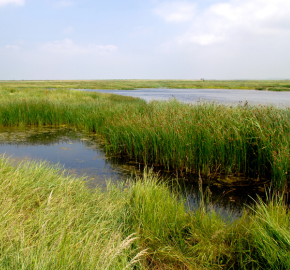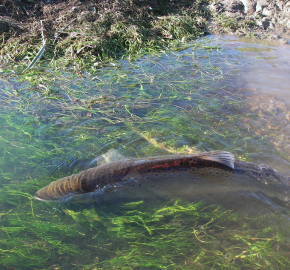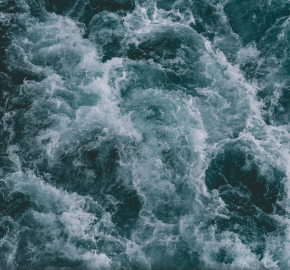Climate extremes are here to stay: what does it mean for wild fish?
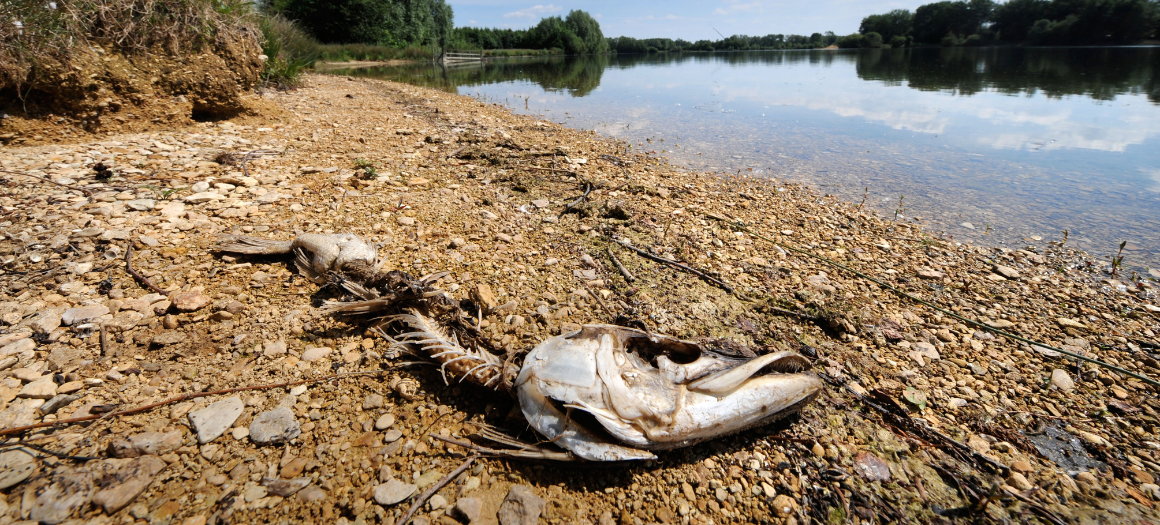
Climate extremes are making life super tough for our fish and their rivers. This year’s drought has magnified the impacts of abstraction and pollution. We might not be able to do much about climate (at least in the short term), but we can cut abstraction and clean up our rivers. The need to protect our rivers’ biodiversity has never been greater.
2025 is shaping up to be another year of unprecedented heat. While extreme weather events once made headlines for their rarity, they now dominate the news cycle with unsettling frequency. According to the World Meteorological Organization, there’s an 80% chance that at least one of the next five years will surpass 2024 as the warmest on record (WMO, 2025). Even more concerning is the 86% chance that one of the next 5 years will be 1.5°C warmer than pre-industrial levels.
This is not abstract modelling. We are living it. June 2025 was the hottest on record in England, and the second warmest across the UK since records began (NCEI, 2025). Overall, 2025’s spring mean temperature of 9.5°C was 1.4°C above the average, making it the warmest UK spring since records began in 1884 (Met Office, 2025a).
Globally, it was the third-warmest June in recorded history — part of a relentless trend, with every June since 2016 ranking in the top ten (NCEI, 2025). Arctic sea ice recorded its lowest maximum extent since satellite monitoring began 47 years ago, 1.31 million square kilometres (506,000 square miles) below the 1981 to 2010 average (NSIDC, 2025).
It’s not just land temperatures that are rising. Near-coast sea surface temperatures around the UK have increased by nearly 1°C since 1961–1990, with 2024 ranking as the sixth warmest year for ocean heat (Kendon et al., 2025). Five of the ten warmest years for sea surface temperatures have occurred in the past decade (2015-2024). These changes are not distant possibilities. They are already affecting river systems, marine ecosystems, and the wild fish that depend on them.
In short, extreme heat is no longer the exception. It increasingly appears to be the baseline.
Drought looms across the UK
As heat intensifies, rainfall patterns across the UK have become increasingly erratic. Despite wetter winters, spring 2025 was England’s driest in more than a century, followed immediately by its warmest June (Poynting et al., 2025). These events have tipped large swathes of the country in the East and West Midlands into official drought, joining the North West and Yorkshire.
As more droughts are declared, the Environment Agency has warned that without dramatic action England will have a daily shortage of nearly six billion litres of water per day by 2055 (BBC, 2025a). Customers would need to cut their water usage by 30 litres per day if this is the case.
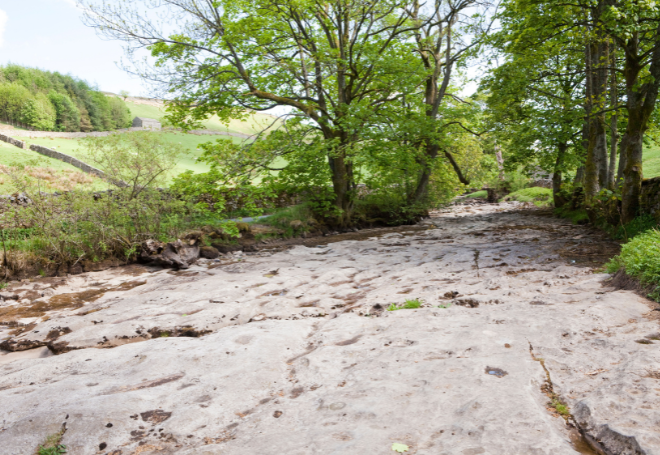
The rocky bed of the River Dee dried up in Cumbria as a result of an early summer drought. ©Stephen Dorey
Extreme is the new normal
According to the State of the UK Climate in 2024 report, the UK has been warming by 0.25°C per decade since the 1980s, with the decade (2015–2024) being 1.24°C warmer than the 1961–1990 baseline (Kendon et al., 2025).
What was once considered extreme is now the new normal. The number of days with extremely high temperatures, 5°C, 8°C, or even 10°C above average have doubled, tripled, and quadrupled, respectively, since the 1960s (Kendon et al., 2025). These extremes are testing the limits of ecosystems and infrastructure that evolved under far more stable conditions.
Rainfall is also becoming more extreme. The number of “very wet” months (twice the long-term average precipitation) have increased by over 50% since the 1990s, leading to a paradoxical mix of drought and flood (Kendon et al., 2025). Winter rainfall is rising while summers become increasingly dry. The UK is not just warming; it is becoming hydrologically chaotic.
All of these uncertainties and extremes in our climate adds up to a shrinking margin for aquatic life to adapt.
Marine Heatwaves: A simmering sea
The ocean, once a buffer against the worst of climate change, is now absorbing its impacts at full force. In late June and early July, sea surface temperatures off the coast of Majorca exceeded 30°C, up to 6°C above average for this time of year (BBC, 2025b).
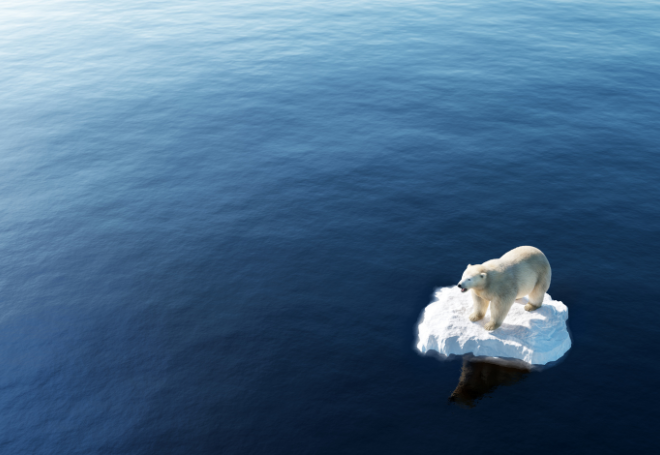
©Getty for Canva
These are marine heatwave conditions, and they are becoming more frequent and intense due to climate change.
Globally, the number of days of extreme sea surface heat has tripled over the past 80 years, with climate change estimated to have added 1°C to peak marine heatwave intensity (Marcos et al., 2025).
This isn’t just bad news for coral reefs and tropical systems, it affects the UK’s coastal waters too. At the start of July, waters in the Celtic Sea, English Channel, and Southern North Sea were classified as a moderate to strong marine heatwave, with sea surface temperatures 1.5°C to 3°C above the 1982–2012 average (Met Office, 2025b). Across the Northwest European shelf seas, temperatures have averaged 14.6°C, making this the third-warmest 1st of July on record, behind only 2009 and 2023. These temperatures are more typical of early August in previous decades. Observations from buoys like E1 near Plymouth show persistently elevated temperatures, with just 15 days in June falling within the normal baseline range.
As sea temperatures rise, so does the risk to marine ecosystems. Most marine species have thermal thresholds beyond which they can’t survive, and even when those aren’t breached, prolonged heat exposure can lead to sub lethal effects; reducing reproduction, growth and resilience. For species already near their thermal limits, marine heatwaves can be catastrophic.
Water, water, everywhere, and all the fish did shrink
Fish are at the frontline of this crisis. Cold-water species like salmon and trout, already under pressure from pollution and habitat loss, now face a double blow: shrinking, warming rivers and collapsing seasonal rhythms.
UK marine life is already showing signs of climate-driven change. Warm-water (Lusitanian) fish are appearing in British waters, while some cold-affinity species are declining (Wright et al., 2020). Shifts in fish distribution are difficult to track precisely but changing water temperatures and mismatches of the once-predictable synchrony between fish larvae and blooms of their plankton prey is breaking down, affecting recruitment and long-term viability.
Warming waters also reduce oxygen solubility and increase metabolic stress, especially for species like salmon and trout that depend on cold, oxygen-rich rivers. These physiological stresses are now possibly limiting the growth rates, maturation ages and maximum size of several fish species. (Wright et al., 2020).
Globally, the effects are even more stark. When extreme high-temperature events hit Exclusive Economic Zones, 77% of exploited fish and invertebrate species experience biomass declines, and catch potential drops by around 6% (Cheung et al., 2021). Climate change represents a growing threat to both food security and marine biodiversity across the globe.
Climate change is happening right now
Britain is not simply experiencing a run of hot years; we are living through a structural climate shift. The systems that sustain our rivers, fisheries, and aquatic biodiversity are being reshaped by warming temperatures, unpredictable precipitation, and growing human pressure.
The ocean is warming. Our rivers are shrinking. Fish are disappearing. We need more than short-term fixes. We need a long-term strategy that puts ecosystem health and climate resilience at the centre of national water policy.
List of References:
BBC. (2025a, June 17). England needs more hosepipe bans and smart water meters—EA. BBC News. https://www.bbc.com/news/articles/cj939kpnvx8o
BBC. (2025b, July 12). Intense Mediterranean Sea heatwave raises fears for marine life. BBC News. https://www.bbc.com/news/articles/c4g2v1l7j6yo
Cheung, W. W. L., Frölicher, T. L., Lam, V. W. Y., Oyinlola, M. A., Reygondeau, G., Sumaila, U. R., Tai, T. C., Teh, L. C. L., & Wabnitz, C. C. C. (2021). Marine high temperature extremes amplify the impacts of climate change on fish and fisheries. Science Advances, 7(40), eabh0895. https://doi.org/10.1126/sciadv.abh0895
Kendon, M., Doherty, A., Hollis, D., Carlisle, E., Packman, S., Jevrejeva, S., Matthews, A., Williams, J., Garforth, J., & Sparks, T. (2025). State of the UK Climate in 2024. International Journal of Climatology, 45(S1), e70010. https://doi.org/10.1002/joc.70010
Marcos, M., Amores, A., Agulles, M., Robson, J., & Feng, X. (2025). Global warming drives a threefold increase in persistence and 1 °C rise in intensity of marine heatwaves. Proceedings of the National Academy of Sciences, 122(16), e2413505122. https://doi.org/10.1073/pnas.2413505122
Met Office. (2025a). Double record breaker: Spring 2025 is warmest and sunniest on UK record. Met Office. https://www.metoffice.gov.uk/about-us/news-and-media/media-centre/weather-and-climate-news/2025/double-record-breaker-spring-2025-is-warmest-and-sunniest-on-uk-record
Met Office. (2025b, July 5). Waters surrounding UK experiencing significant marine heatwave. Met Office. https://www.metoffice.gov.uk/blog/2025/waters-surrounding-uk-experiencing-marine-heatwave
NCEI. (2025). Monthly Climate Reports | Global Climate Report | June 2025. National Centers for Environmental Information (NCEI). https://www.ncei.noaa.gov/access/monitoring/monthly-report/global/202506
NSIDC. (2025). Arctic sea ice sets a record low maximum in 2025. National Snow and Ice Data Center. https://nsidc.org/sea-ice-today/analyses/arctic-sea-ice-sets-record-low-maximum-2025
Poynting, M., Climate, J. R. B. N., & Science. (2025, July 15). Drought declared in Midlands after hot, dry weather takes its toll. BBC News. https://www.bbc.com/news/articles/cx201001n79o
WMO. (2025, May 19). WMO Global Annual to Decadal Climate Update (2025-2029). World Meteorological Organization. https://wmo.int/publication-series/wmo-global-annual-decadal-climate-update-2025-2029
Wright, P., Pinnegar, J. K., & Fox, C. (2020). Impacts of climate change on fish, relevant to the coastal and marine environment around the UK.


